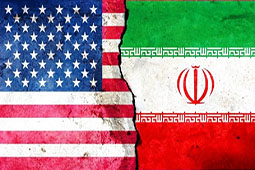
Trades in Tehran Stock Exchange on Rise Year after US Sanctions

TEDPIX, the main index in Tehran Stock Exchange (TSE), rose 1.31 percent to 278,469 points while the price index TEPIX was also up 1.31 by gaining 967 points to stand at 74,844, a report by the IRIB News on Tuesday said.
A total of 4.401 billion shares were traded in the TSE in 420,000 times of exchange on Tuesday with an overall value of 17.340 trillion rials (over $155 million), said a local media.
The highest-yielding shares traded in the market on Tuesday were for publication and printing companies, followed by firms active in engineering and construction, communications, garment, woodwork and paper production sectors.
The rally came against the backdrop of reports from a summit of G7 industrial countries in France where leaders agreed to find a solution to a stalemate between Iran and the United States.
The upbeat data pushed Iran’s currency rial higher against the US dollar as many household flocked to the markets to sell their foreign currency savings.
TSE chief Shapour Mohammadi confirmed that the G7 meeting had impacted the trades in the stock market. He told the ILNA news agency on Tuesday that a trip two days earlier by Iranian Foreign Minister Mohammad Javad Zarif to France to meet French officials concurrent with the G7 summit helped stocks rally.
Mohammadi said the value of shares traded in the TSE and a subsidiary market meant for securities had increased by more than three times to reach a daily record of above $270 million.
Reports over the past months have suggested that Iran has managed to weather the harsh impacts of the American sanctions.
The Bloomberg said in a report last week that Iran’s tightened control on currency transfers and its reform plans for various sectors of the economy had already yielded results, adding that businesses and households were adapting to the situation that has followed the sanctions.
On Saturday, The Statistical Center of Iran (SCI) announced that inflation rate has declined by 6.4 percent, adding that it is the first such decline after 16 months of turbulence since Trump unilaterally withdrew Washington from the nuclear deal between 5+1 and Tehran.
The announcement comes amid reports suggesting that Iran is emerging from economic losses suffered as a result of US sanctions.
The sanctions began in November 2018, five months after US President Donald Trump withdrew from an international deal on Iran’s nuclear program.
Claiming that the bans were working properly, Trump tightened them in May, only to see that Iran was finding new solutions to recoup the losses.
Since earlier last month, Iran’s national currency rial has regained some of its lost value, currently trading at 116,000 against the US dollar, and significantly up from historic lows of 190,000 in September 2018.
Inflation for staples, medicine and basic goods declined in August, according to the SCI’s Saturday statement, with 56.6 and 35.2 percent for food and non-food items, respectively.
On Thursday, Iranian First Vice-President Eshaq Jahangiri underscored that the measures and plots hatched by Washington to lead Iran's economy into collapse have all failed.
"We have been able to defeat the US plots with the strategy of resistance," Jahangiri said, addressing a ceremony in the Northern city of Noshahr.
"The US threatens the foreign governments and companies (not to cooperate with Iran) but it has not been able to attain its most important goal, that is the collapse of Iran's economy," he added.
In relevant remarks in July, Jahangiri stressed that his country's economy had remained stable one year after the US imposed the toughest embargos against Tehran.
"The US imagines that it can zero down our oil sales by exerting pressure on the countries which purchase Iran's oil to lead Iran's economy towards a collapse, but fortunately, the situation of Iran's economy enjoys an acceptable stability one year after the US oil sanctions," Jahangiri said in a meeting with Head of the International Liaison Department of the Communist Party of China Song Tao in Tehran.
He described China as the main economic partner of Iran and oil customer, and said, "All high-ranking Iranian officials have put the strategy to develop ties with China on their agenda as a serious mechanism."



Trump weighs using $2 billion in CHIPS Act funding for critical minerals

Codelco cuts 2025 copper forecast after El Teniente mine collapse

Electra converts debt, launches $30M raise to jumpstart stalled cobalt refinery

Abcourt readies Sleeping Giant mill to pour first gold since 2014

Barrick’s Reko Diq in line for $410M ADB backing

Nevada army depot to serve as base for first US strategic minerals stockpile

Tailings could meet much of US critical mineral demand – study

Viridis unveils 200Mt initial reserve for Brazil rare earth project

SQM boosts lithium supply plans as prices flick higher

Energy Fuels soars on Vulcan Elements partnership

Northern Dynasty sticks to proposal in battle to lift Pebble mine veto

Giustra-backed mining firm teams up with informal miners in Colombia

Critical Metals signs agreement to supply rare earth to US government-funded facility

China extends rare earth controls to imported material

Galan Lithium proceeds with $13M financing for Argentina project

Silver price touches $39 as market weighs rate cut outlook

First Quantum drops plan to sell stakes in Zambia copper mines

Ivanhoe advances Kamoa dewatering plan, plans forecasts

Texas factory gives Chinese copper firm an edge in tariff war

Energy Fuels soars on Vulcan Elements partnership

Northern Dynasty sticks to proposal in battle to lift Pebble mine veto

Giustra-backed mining firm teams up with informal miners in Colombia

Critical Metals signs agreement to supply rare earth to US government-funded facility

China extends rare earth controls to imported material

Galan Lithium proceeds with $13M financing for Argentina project

Silver price touches $39 as market weighs rate cut outlook

First Quantum drops plan to sell stakes in Zambia copper mines

Ivanhoe advances Kamoa dewatering plan, plans forecasts

















